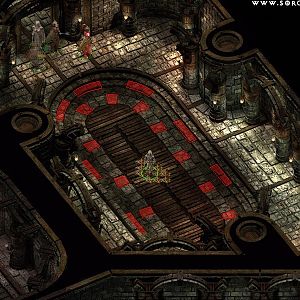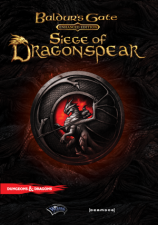-

- Forums
- Chatrooms
- Gallery
- Gameplay Videos
- Upload
- Articles
- Mod Reviews
- Shop SP: Games, Movies, Books

 1.
SP: For starters, could you please tell us a few words about the
Planewalker Games team and your role in it?
1.
SP: For starters, could you please tell us a few words about the
Planewalker Games team and your role in it?
Jason Compton: Planewalker Games LLC is a new, independent game studio created specifically to develop and publish The Broken Hourglass. I am the company's managing member and serve as the producer of the game. The company has no employees as such but we have a group of about 20 contractors working with the company who have provided everything from world design documents to music.
2. SP: What has motivated you to start making The Broken Hourglass, and what is your final vision for it?
Jason Compton: It all comes down to the fact that it's been almost five years since the release of Throne of Bhaal, and nobody has done a game like Baldur's Gate 2 since then. TOEE is kinda-sorta like it, KOTOR is kinda-sorta like it, but it's clearly not enough since players keep saying "Why doesn't anybody do games like BG2 anymore?" We certainly got tired of waiting, and it seemed that with so many people actively clamoring for a similar style of game that there was a significant opportunity for people who understood that style of game.
It also helps tremendously that I have a business partner, Westley Weimer, who somehow let me talk him into designing a suitable CRPG ruleset and game engine to pursue the opportunity—without that, I would still be sitting here idly musing on the reasons nobody makes them like they used to. Really, the scenario is eerily similar to how both Wes and I started modding BG2 in the first place five years ago (and by extension, how our paths first crossed)—people lamented for months on end that there weren't enough mods for BG2 of the kind they wanted to play, so with nobody else doing it, we both ended up answering the call and doing something about it.
The final vision, then, is to produce a quality CRPG that delivers a gameplay experience people have been clamoring for, but not receiving from the mainstream studios and publishers, for going on half a decade. There are independent developers out there who do well for themselves preserving an aesthetic that's circa 1992 or so. We'd like to be able to do the same, moving the target forward the better part of a decade. The vision, of course, includes lots of people buying the game and convincing us that this was in fact a risk worth taking.
3. SP: How exactly is having played the Infinity Engine AD&D games (such as the Baldur's Gate and Icewind Dale series) and creating mods for them for a few years influencing the choices you are now making as developers?
Jason Compton: Well, certainly, spending such a long time studying one game and one game engine exposes a lot of its strengths and weaknesses. So it was almost unfairly easy to start out and make some clear and obvious choices, such as having a game engine which didn't have a fixed, hard party limit and avoid "I've rescued you! Now you're on your own, as I have no room in my party!" silliness. (Not that we're going to have an NPC rescue plot in TBH, but it's nice to know that if we ever do a WeiNGINE game that does feature it, we won't put the player in a ridiculous quandary.)
But the flipside is that the reason those games have endured and we've been interested in adding on to them for so long is that they did a lot of things right. So there were many cases in interface and engine design where we decided that any tie or ambivalence among our feelings on the subject should probably be "won" by the approach they took, simply because it had been proven to work quite well, sell a lot of games, and generally keep people happy. Not to say those games are the One True Approach to playing a CRPG, but they did set some valuable and worthwhile examples, and we can spend our time in much better ways than trying to reinvent those particular wheels.
4. SP: What were your other inspirations, apart from your experience with the Infinity Engine games?
Jason Compton: I'm sure all of the developers have brought their own background and unique influences to the table. For my part, I would like to think that I'm influenced by some of the greats of the 1980s, such as Alternate Reality, Wasteland, and Bard's Tale. Each of those games is rather different from what we're doing, of course, but if some of their quality rubbed off on me and I'm able to impart it to Broken Hourglass, then I'm happy.
5. SP: How familiar will the setting and the rules system be to a Baldur's Gate series fan and what are the most radical changes he or she will experience?
Jason Compton: BG players specifically or simply D&D players generally shouldn't have too much trouble adapting to the setting—superficially, it falls under the "sword and sorcery" or "mage and metal" category. The Byzantine-inspired flavors should be a breath of fresh air. The most significant difference that a D&D/BG player may find is that although our setting does have magic and swords and pikes and cruel, excessively tattooed elves and whatnot, it's comparatively light in the "wandering and marauding monster" department—most of the "baddies" in our world are, in fact, other people, not dog-faced monsters. That's not to say there aren't a few strange and unusual creatures in the bestiary, however.
As far as rules go, players have more options to develop weapon proficiencies and attack speed, and primary abilities can be raised at any time alongside secondary or skill-type abilities, which generally speaking are on a scale from 0 to 100. The system favors effects that happen "on a gradient" rather than "in binary fashion", meaning that there aren't spells that immediately put you to sleep if you fail to meet a target roll, but instead would make you "act sleepier" by reducing your speed or making you feel more encumbered or some such.
As far as the interface goes, most of the changes are evolutionary rather than revolutionary. For instance, rather than having a "thieving mode" button, we simply presume that you are always on the lookout for traps and secret doors and hidden compartments and whatnot. Similarly, if you try to take a path through a closed door, we presume you want to open it. If you click on a trap or a locked door, we presume you want to try to disarm/unlock it. By the way, opponents for whom it would be sensible (i.e., those with hands) can also manipulate doors as part of their standard AI. They also can pick up and use loot dropped on the ground… so if you lose a party member with valuable gear, you may find it being used against you in the rest of the fight!
6. SP: Can you cast some more light on your partly class and partly skill-based character advancement system?
Jason Compton: We are trying to combine the best elements of point-buy flexibility and level-path clarity while maintaining the notion that NPCs have distinct personalities. As I mentioned, there are many attributes which can be boosted with experience points, and for players who enjoy total control over their PC power, they will be able to freely spend each and every point in the category they choose. For players who don't enjoy trying to work out the best balance of skills, we will offer several pre-built level "paths." So a "pikeman" path would tend to put points into polearm precision and strength, while an "ice mage" path would favor judgment, mana, and ice magic proficiency. There will be some points left over for free allocation by the player into traits or additional skill purchases, however.
NPCs must be advanced along paths which they "approve of", because it doesn't follow that just because a gladiator joins your party that he wants to become an archer. Different NPCs will approve of different paths, and it will be possible to convince some NPCs to branch out into new areas as well. We don't want to unreasonably restrict party composition flexibility—each NPC will approve of multiple paths. But we do want to preserve a sense that they have distinct preferences about how they wish to further develop their skills. And since paths won't spend 100% of points, players will still have some freedom to pour NPC points into areas they find most important to the health of the party.
7. SP: Also, how will magic work in the game world, spells, artifacts, crafting (if this will be in)?
Jason Compton: Magic works on a mana potential system, or as engine designer Westley Weimer puts it, a "garden hose" system. Think of mana as being the pressure of the water coming out of the spout. Over any given period of time, you can use the water coming out of the hose full-blast to shoot at an opponent, or you can splice the hose to slowly water several garden beds at once. But it's all the same amount of water available to you at any moment.
So what that means in the game context is that if you have a standing, long-term enchantment, such as a stat bonus or a heal applied, that takes away from the rest of the mana "flow" available to shoot at enemies in the form of firebolts or ice shards or whatnot. Equipping a magical weapon has a mana cost as well, representing the magical focus the wielder must exert in order to control and benefit from the item. (This, incidentally, is why mana doesn't necessarily get entirely neglected by front-line fighters in our system.) Instantaneous effects, such as the aforementioned firebolts and ice shards, do not deplete the mana potential.
As far as recovering that long-term mana, enchantments drop when combat ends, the target dies, or the party rests, depending on the situation.
Spells can be selected from a spellbook, or built on the fly by selecting a magic source (fire, air, water, earth, or physical), a target, and an effect (stat drain, stat boost, direct damage, damage over time, etc.)
We do not have player crafting of weapons, potions, or that sort of thing. There is a place in CRPGs to collect up 11 herbs and spices and make the secret recipe in your well-stocked pantry, just not in this particular CRPG. There will be some specialists in the game who can build or enhance specific items, however.
8. SP: What will combat look like in terms of mechanics and in general?
Jason Compton: Combat is real-time with manual and auto-pause.
When someone attacks, the engine rolls a random number, adjusted by their weapon skill (that includes magic proficiency), Tactics skill bonus, the target's cover if it's a missile attack, and other miscellaneous factors. The victim makes a defense roll adjusted by an appropriate defensive skill for the attack (Dodge, Parry, or Deflect), with bonuses for Tactics skills and penalties depending on their Facing situation (if they are being mobbed, it's difficult to defend properly) and the bulk-weight of the weapon being used against them. If the attack roll exceeds the defense roll, there is a hit, and the degree to which it beat the defense roll determines how much damage is applied. Armor provides damage resistance/reduction.
Weaponry has different qualities which determines how well or poorly the target can parry or absorb the blow. For instance, a Penetrating weapon such as an arrow or a spear will negate some of armor's resistance because it is specifically designed to pierce armor. Other types of weapons are Flexible and harder to deflect. And so on.
9. SP: Speaking of the game world, how about some numbers? How many quests, NPCs, joinable party members, hours of playing time are you aiming for roughly?
Jason Compton:
Quests- We're still writing more. Dozens, certainly.
Joinable NPCs- Nine.
Target hours of playing time- I'd love to deliver first-time players
an honest 20 hours of entertainment. We'll see what the final pudding
brings.
10. SP: A bit on the ethical side, what options will the players be given and how do they compare to the D&D alignments? What about reputation?
Jason Compton: We are not using an explicit "alignment" system—players can make up their own mind what their character's moral standing is, and judge for themselves what the "true natures" of the characters they encounter and team up with are.
Outside of the party, reputation will mostly be situational (B may object to how you specifically treated A previously, but may not know or care what you did about C), although the overarching stack of deeds done or undone by the party will have an impact on the endgame and epilogue. Within the party, NPC opinions will be influenced largely by the qualities displayed by the PC in actions and dialogues—some NPCs will reward displays of passion, others will scorn such emotional outbursts, for instance.
As far as the ethics within the quests, there will sometimes be multiple paths to "satisfactorily complete" a quest, but as a design rule, I do not believe that every single quest must have a fully-realized option for "shoot everybody in the face and still come out smelling like a rose." Sometimes the cruelest option is to simply withhold aid, after all. Although being shot in the face is no fun either.
11. SP: Will players be able to construct or otherwise acquire strongholds of their own, or join factions? If so, how much variety will there be?
Jason Compton: The player will quickly obtain a "home base" but it would be exaggerating to call it a stronghold as such. And although there will be power groups within the city to be appeased and manipulated, there is not an explicit factional system in the usual, Torment-y sense of the word.


